The annual Fête Votive rolled into Lourmarin last week, completely consuming this tiny Luberon village, as it does every year on the last weekend in August. Unfortunately, the mistral blew into town around the same time; but nothing could dampen the palpable excitement that fills the hearts of the inhabitants of Lourmarin and their guests during this festival.
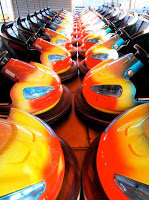
Every village in Provence has a fête votive, each slated for a particular weekend every year. These fêtes or festivals probably had their origin in the Catholic practice of honoring the patron saint of the village, but are now clearly more secular than religious. “Votive” refers to the fulfillment of a vow which, in this case, would be to remain dedicated and grateful to the saint(s) who protectively watch over the respective village. No one with whom we spoke, however, was the least bit familiar with the religious aspect of Lourmarin’s fête votive. It really had much more to do with having a party, they said. And, to that end, Lourmarin was…
tremendously successful. The festivities actually commenced the night before the four-day even began. While the wonderland of games and amusement rides stood patiently, the locals attended a pot luck dinner on the main drag of the village, complete with a full bar—the pastis was flowing—and a live band. The next afternoon, the tiny midway came alive with bright lights, music, laughter, and screams of delight, and the fête officially opened. An orchestra took the stage in the evening and dancing in the street followed.
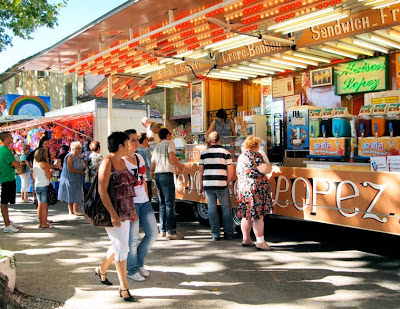 |
| Junk food does exist in France! |
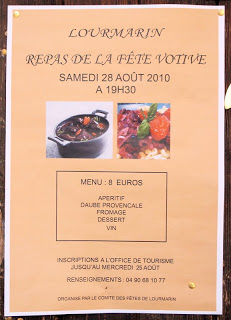
On Saturday evening, Le Repas de La Fête Votive takes place. This is a huge dinner, served family style. This year the menu consisted of an apéritif, daube Provençal and coquillettes, fromage, and dessert—all for eight euros!!!! And,
bien sûr, the wine was included! Another band takes the stage later on. On Sunday, the band plays again. Apéritifs are served on Monday evening and another band takes the stage that evening.
Sports play an integral role in the activities as well. Over the weekend, villagers gather for the tournoi de foot in which various groups in town—the Tennis Club, Pizzeria Nonni, Café L’Ormeau, and the like—field teams that play short matches of football on soccer field that dominates the town. Some teams take this event more seriously than others and we saw some footwork that rivaled that that was demonstrated by the French National team in South Africa this summer. Other teams get wrapped up in the liberal consumption of alcohol that encourages all sorts of mischief and downright silliness. One year, one of the teams showed up on the field—after a long lunch that included a lot of rosé—dawned in wigs and a wild attire that is still talked about. This year, our daughter got to play on the Café Gaby team.
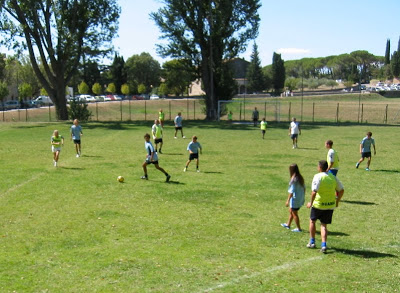 |
| Café Gaby team looking for an elusive victory |
Both boules and petànques tournaments take place, attracting many teams from around the Luberon every year and a respectable crowd as well. This year, with a relatively new and larger Boulodrome, the events seemed to attract even more people than we had seen in years past.
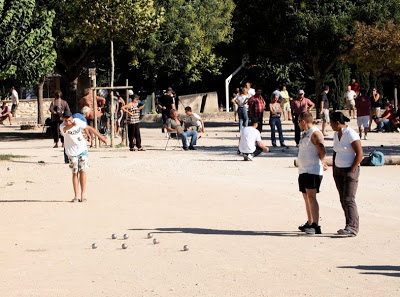 |
| Boules tournament at the Boulodrome |
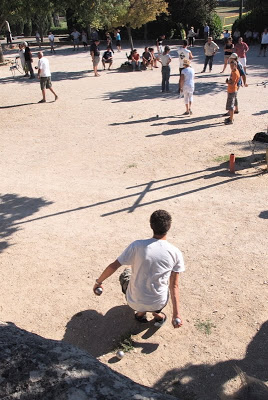 |
| Demonstration of proper form |
The fête is really quite small and, from an American standpoint, refreshingly devoid of commercialism. Beyond some crepes, Barbe à Papa that elevates cotton candy to something gourmet, a fried dough called ChiChi, and a bar of pastis, wine, champagne, and beer, there is very little for sale. It is just the right size for fun and a lot of socializing. Just like Friday’s market, it is wonderful catalyst for bringing the whole village together–all ages, all classes.
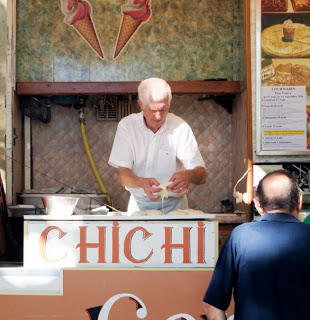 |
| Freshly made ChiChis at the Fête |
On Thursday evening, we exchanged a few words with the mayor who was helping to set the stage up. He told us that he loved this time of year, when the fête comes to town, a sentiment shared by nearly all villagers with whom we spoke.
The Fête Votive typically culminates with a fabulous display of feu d’artifice with the Lourmarin Château as the backdrop. This year, the mistral had other plans—the temperature plummeted to 62 F/16 C (not counting the wind chill, a factor I normally confine to conversations about New England weather!) and cold winds ripped through the village that Monday night, forcing the fireworks to be canceled. But, the parade marched through the village, the band played on, and the crowd rocked. It was indeed a successful fête.
 |
| Alex in 2005 |
|
|
|
|
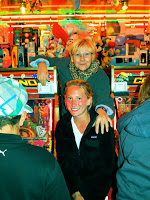 |
| Alex in 2010 |
|
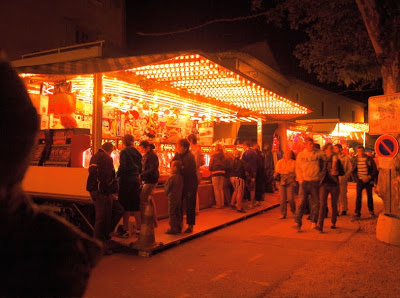 |
| Late night at the Fete |
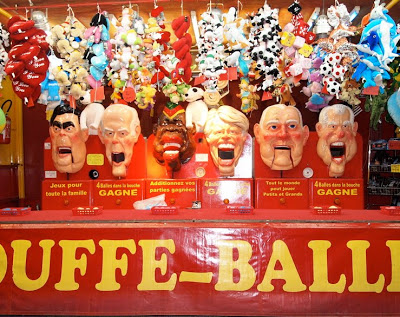 |
| Former world leaders are a popular target |
|
|
|
|
|
|
|
|
|
|
|
|
|
|
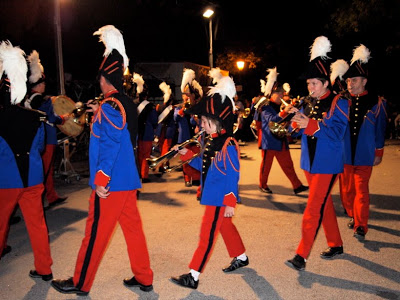 |
| The Parade |
 |
| Feu d’Artifice in 2002 |
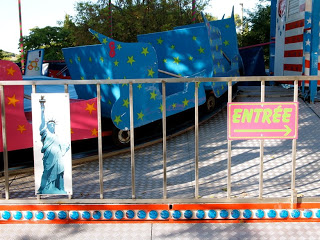

 On Saturday evening, Le Repas de La Fête Votive takes place. This is a huge dinner, served family style. This year the menu consisted of an apéritif, daube Provençal and coquillettes, fromage, and dessert—all for eight euros!!!! And, bien sûr, the wine was included! Another band takes the stage later on. On Sunday, the band plays again. Apéritifs are served on Monday evening and another band takes the stage that evening.
On Saturday evening, Le Repas de La Fête Votive takes place. This is a huge dinner, served family style. This year the menu consisted of an apéritif, daube Provençal and coquillettes, fromage, and dessert—all for eight euros!!!! And, bien sûr, the wine was included! Another band takes the stage later on. On Sunday, the band plays again. Apéritifs are served on Monday evening and another band takes the stage that evening.











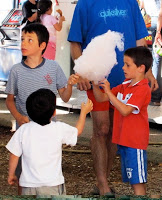





Quel hoopla! peut-être un jour… ah, yes, maybe someday we'll to take in the fête votive. What a refreshing idea, a town party that isn't tainted with political overtones, commercial trash, or cheapjack jingoism — can't think of an even close similar effort here in the New World… alas, more's the pity.
Its long forgotten origins and an occasional nasty wind notwithstanding, the fête votive still sounds like a hoot — laissez-nous avoir du plaisir! (translation, let's rock!).
Mike
Mike,
It was a hoot! You and Betsy would both have fun and subjects for your watercolors are plentiful, too! Merci for your note.
All the best,
Susan
Wow – it brings back such wonder-filled memories of our evening at the Fête Votive in 2008. Sadly, we missed the fireworks – perhaps there didn't have them or we were sound asleep! But we loved watching the dancing – people of all ages on the floor with the live band playing their requests!
Were the ChiChi funnel cakes made from chickpea flour? In Tuscany, there are Cecina (like a pancake), and in Sicily Ceci Cakes(a fried pastry), both similarly pronounced to ChiChi. One has to wonder….
And now, the difference between boules and pétanques? Inquiring minds want/need to know…
As promised, I will be posting the recipe for fennel-tomato soup with pastis on Wednesday – keep an eye out at http://www.cocoaandlavender.blogspot.com!
A bientôt! And thanks fro taking us all back to Lourmarin!
David
Hi David,
Well, it seems we simply must return next year to sample the chichi cakes….although what type of flour is used really sounds like a question for you and Doreen and http://www.cocoaandlavender.blogspot.com !!!
The boules and pétanque question….
First, let me make a correction to my article: A French friend wrote to say that latter game is not written in the plural form (as I did in the piece above).
Second, to your question (which inspired more conversation with the same French friend and a little research as well): pétanque is a form of boules that has departed from the original game in two main ways: the piste (or runway down which the boule is launched) is shorter and the player is confined to one spot when he or she launches the boule into play. The word, pétanque, comes from the Provençal expression "a pes tanca," meaning to keep one's feet together or anchored (when putting the boule into play). Thus, rather than taking a few steps before launching the boule, the player stands inside a circle as he or she sends the ball into play. This version of boules was created in 1907 in La Ciotat, a small town on the Mediterranean coast near Marseille. As the story goes, a well-known and well-liked former boules champion, Jules LeNoir, was no longer able to take the necessary steps down the piste to launch the ball–the reasons cited range from rheumatism to an accident that paralyzed him from the waist down–and so, a new version was created in order to include this popular man.
Pétanque's popularity is rapidly growing, especially among the fashionable young in France and elsewhere. A recent article in The Guardian has this story: http://tinyurl.com/22klfe8
Now, I am off to your blog to see about fennel-tomato soup with Pastis!
Amitiés,
Susan
The last evening of two dreamlike weeks in Lourmarin a couple summers ago was the opening night of the fete votive. How charming to recall through your essay the pleasant experiences: seeing the dinner zig-zagging up the tilted main street, walking about among the colorful lights under the plane trees overlooking the chateau beyond the soccer fields, and drifting off to sleep to the tune of distant music and voices. – Mark
Hi Mark,
Your lovely comment recalling the details of a scene from the fete votive sums it all up so well–dreamlike.
Thanks so much for your note.
Amitiés,
Susan